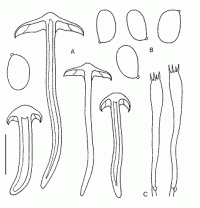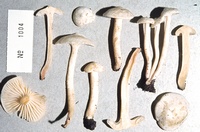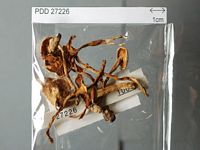|
 Camarophyllus impurus Camarophyllus impurus
SynonymsHygrocybe impura
BiostatusPresent in region - Indigenous. Endemic
Images (click to enlarge)
Caption: Fig. 19 Camarophyllus impurus Horak (A-C: PDD 26266, Type): A. basidiomes. B. spores. C. basidia | 
Caption: ZT1004, Holotype
Owner: E. Horak: © Creative Commons Attribution-Noncommercial 3.0 New Zealand | 
Caption: Dried type specimen
Owner: Herb PDD |
Article: Horak, E. (1990). Monograph of the New Zealand Hygrophoraceae (Agaricales). New Zealand Journal of Botany 28(3): 255-306 (http://www.rsnz.org/publish/abstracts.php).
Description: Pileus -40 mm, hemispherical when young, soon becoming broadly campanulate
finally convex to plane with distinct papilla; margin strongly inrolled in young
specimens; white turning pale argillaceous or pale ochre in aged basidiomes;
viscid to glutinous when moist, minutely fibrillose in dry condition, margin
non-striate. -Lamellae 12-18 (1-3) arcuate to broadly adnate and decurrent with
long tooth, crowded; whitish, occasionally with faint orange tint, edges concolorous,
entire. - Stipe 25-90 x 26 mm, cylindrical or attenuated towards base, often
robust in young specimens; concolorous with pileus, pale ochre-pink in lower
portion, especially at base; dry, conspicuously fibrillose, solid becoming fistulose-hollow,
single or caespitose. - Context pale whitish or ochre in pileus, pale brown
to pink towards base of stipe, soft. - Odour and taste not distinctive. - Chemical
reactions on pileus: KOH - pale yellow. - Spore print white.
Spores 8-9 x 5-6 um, ovoid to elliptical, smooth, hyaline, inamyloid. - Basidia
45 60 x 6-7 um, 4 spored. -Cystidia absent. -Pileipellis an ixocutis of cylindrical,
interwoven, gelatinised hyphae (2-6 um diam.), pigment not observed; clamp connections
present (Pl. 1, Fig., 7),
Habitat: ECOLOGY: Rare; saprobic on soil among litter under Leptospermum scoparium.
June.
Distribution: DISTRIBUTION: NZ (NA).
Notes: ETYMOLOGY: impurus = off white, dirty.
Macroscopically Camarophyllus impurus is similar in many respects to
C. patinaecolor. The basidiomes of both taxa are characterised by white
to off-white colours. C. impurus, however, does not exhibit greenish-blue tinges
which is a typical feature of C. patinaecolor. Microscopically the identification
of the two related taxa is readily established because - their spores differ
clearly in size.
|